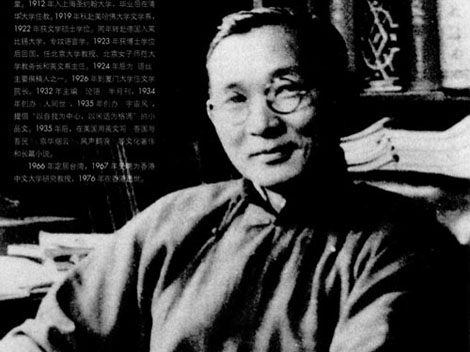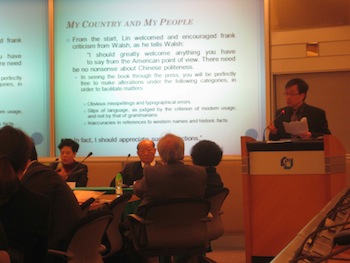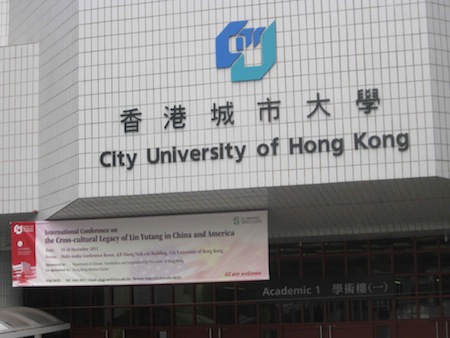NEW SCHOLARSHIP
The Cross-cultural Legacy of Lin Yutang | China Heritage Quarterly
The Cross-cultural Legacy of Lin Yutang
in China and America
City University of Hong Kong 香港城市大學
19-20 December 2011
William Sima
Australian Centre on China in the World, ANU*

Fig.1 Lin Yutang
In January 1930, Lin Yutang 林語堂 (1895-1976) decried what he perceived to be the stagnation of ideas in China. At that time he believed that, just as in the past, intellectual expression was constrained by pedantic attention to form and style—'belles letters'—at the expense of real 'critical thinking'. For Lin China was like a 'frivolous man of letters who has not yet attained to any depth of thought'; criticism was, on the other hand, the 'highest intellectual effort that mankind is capable of', the hallmark of a 'critical culture… [which] does not belong to any one nation, but to the modern world as a whole, in which all nations are members of the world republic of letters and thought.'[1]
Such a dynamic critical culture could only be realized if scholars would broaden their intellectual horizons. On this point, Lin invoked the Han thinker Wang Chong 王充 (27-97CE) and his delineation of scholarly professions as being pertinent to modern China:
I think Wang Ch'ung's classification of scholars into four classes is a fairly good one: 1. rusheng 儒生 or classic specialist; 2. tongren 通人 or all-round scholar; 3. wenren 文人 or writer; 4. hongru 鴻儒 or thinker. And just as a specialist may broaden his knowledge and become an all-round scholar, so we find the professional man of letters may rise to the rank of thinkers.[2]
Lin Yutang was worthy of the designations both of 'all-round scholar' and of 'thinker', and the breadth of his intellectual résumé shows that more perhaps than any other modern Chinese intellectual he personified the tongren 通人. In the 1920s and 30s, Lin was an educator and author of English textbooks, an essayist and proponent of a literary ideal he called 'humour' (youmo 幽默; for more on this see 'Introducing Humour in Chinese Life and Letters', also in New Scholarship—Ed.), and an innovator in the fields of Chinese character classification, language reform and the development of the Chinese typewriter. After achieving international renown with the bestselling English-language book My Country and My People in 1935, for the next thirty years Lin lived primarily in the United States where he continued to write cultural treatises and novels about his homeland. He is widely considered to be China's most important twentieth-century cultural ambassador to the West.

Fig.2 A presenter at the conference
But Lin is a thinker whose place in modern Chinese intellectual history has, until recently, been overlooked. In reengaging with his legacy today it is important to consider what made him distinctive in his time.
The papers presented at the 'International Conference on the Cross-cultural Legacy of Lin Yutang in China and America', held at the City University of Hong Kong on 19-20 December 2011, addressed numerous aspects of Lin's long and multidimensional career. Prior to this academic efforts have focused primarily on Lin's activities as an essayist in the turbulent years of the 1920s and 30s, but the conference provided a forum for a discussion of lesser-studied aspects of his career.
Qiao Suoqiao 錢鎖橋 (City University of Hong Kong), the organizer of the conference, noted in his opening address that while the present event was not the first devoted to this thinker—there have been Lin-themed conventions in Taiwan and Lin's native Fujian—it was the first conducted in both Chinese and English, the two languages in which Lin himself was fluent. Conference participants were also an international group with professional and private scholars from mainland China, Hong Kong, Taiwan, Japan, Malaysia, the United States, Germany and Slovakia, a fact that paid homage to the nature and range of its subject (see the conference programme) here.
The six panel sessions of the conference were organized around the different periods and themes in Lin Yutang's life and career; they covered his six decades of intellectual activity in roughly chronological order. Yang Liu 楊柳 (Chinese University of Hong Kong) who presented in the second panel introduced research on Lin's 'Christian identity crisis' during his formative years at St John's University in Shanghai (1911-16) and examined some of his earliest published work in the student magazine Echo. The sixth panel included independent Taiwanese scholar Tsai Ting Shan 蔡登山 discussed Lin's Wu suo bu tan 無所不談 essays, written in Taiwan in the late 1960s, and questioned previous assumptions about his intellectual demeanor in later life.
We were reminded that Lin Yutang was active in fields other than writing. Lin is often said to be the inventor of the Chinese typewriter, but Thomas Mullaney (Stanford University) dissected this claim to show that, far from inventing the machine, his innovation was in developing a novel system of character-retrieval (jianzifa 檢字法)—a project itself embroiled in debate about language reform and the Chinese script's compatibility with modernity and modern technology. Charles Hayford, editor of the Journal of American-East Asian Relations, explored how Chinese food became seen to be a 'cuisine' among other world cuisines in the twentieth century, and how food featured as part of discourses of cultural representation through the Chinese-American diaspora, both in the writing of Lin Yutang and in the 1969 cookery book Chinese Gastronomy, co-written by Lin's wife and daughter, Lin Tsui-feng 林翠鳳 and Lin Hsiang-ju 林相如.

Fig.3 The conference was hosted by the City University of Hong Kong
The conference was the first step in coordinating and collecting the work of participating scholars, for eventual publication in an edited volume. 'When completed', reads the conference program, 'The Cross-cultural Legacy of Lin Yutang in China and America will significantly enrich and enhance our understanding of modern Chinese intellectual experience, especially from a comparative perspective in terms of its interaction with America. It will fill important gaps in the fields of modern Chinese studies and cross-cultural studies.' This ambitious project will also include a documentary film titled 'Lin Yutang: An Unusual Chinese Man in America', draft excerpts of which were screened at the conclusion of the conference.
An edited volume covering the breadth of enquiry displayed in the conference papers would be a groundbreaking contribution to scholarship on this important Chinese man of letters. But given the nature of much of the work to be included, the stated Sino-American/cross cultural focus of this collaborative effort may possibly be misplaced. Lin is undoubtedly a crucial figure in understanding the modern Chinese intellectual experience, but it may well be problematic to posit that the approach should be couched especially in terms of the interaction of that experience with America. Such a constrictive analytical framework may well foreclose the possibility of approaching Lin's 'cross-cultural' significance from a perspective that is broader than that allowed solely by the 'China-America' nexus. It also would seem to go against Lin Yutang's own dream of realizing an intellectual utopia when 'all nations are members of the world republic of letters and thought.'
Of course, in terms of Lin Yutang's biography the Sino-American focus is entirely understandable. If we consider his activity in China in the 1920s and 30s to be the first half of his career, his later activity promoting Chinese culture with English-language cultural treatises and novels, in America, is the second. Qian Suoqiao explored the connection between these two phases of Lin's life most directly. His paper posed the question: 'How did Lin change his role from a Chinese translator of Western ideas into Chinese to a Chinese interpreter of Chinese cultural ideas into English', and he addressed it with a meticulously researched study of the early years following Lin's arrival in America (1935 to 1938). Qian bought these crucial years to life with fascinating detail drawing on Lin's correspondence with the novelist Pearl Buck and Richard Walsh, proprietor of the John Day publishing company, which played a key role in establishing Lin's international profile.
Of the seventeen papers presented, however, only a small number concerned themselves substantially with the meeting and overlap of the Chinese and American halves of Lin Yutang's career; others, while attending to questions of his contact with Western ideas and their influence on his thinking, did so in a way that did not wholly concern 'the West' read as 'America'. Fan Liya 范麗雅 (University of Tokyo), for instance, examined the reaction of Lin Yutang and others involved with the journals The China Critic and T'ien Hsia, to the International Exhibition of Chinese Art held in London in 1935-36. While Fan discussed issues of cultural self-perception and the cross-cultural interpretation of Chinese art of Lin and his contemporaries, her concern was not with America per se but rather with China and the world more generally—T'ien Hsia/tianxia, by definition (see the September 2009 issue of China Heritage Quartelry on T'ien Hsia—Ed.).
In other papers, questions of cross-cultural encounters, Sino-American or otherwise, were either largely absent or inconsequential to the research. Ho Khai Leong 何啓良 (Universiti Tunku Abdul Rahman, Malaysia) explored Lin's ill-fated tenure as chancellor of Nanyang University, Singapore, in 1954-55. This paper focused on a particularly heated moment of political strife in Singapore that largely evaded the 'Sino-American' rubric altogether; nonetheless, it is still one that remains crucial to our understanding of Lin Yutang's political proclivities during his post-1949 years.
Since the topics of the presentations were so diverse, there were moments during the conference, particularly during question sessions, when the focus on 'China and America' slipped from consideration entirely, or appeared to be somewhat out of place. During the final question session one participant suggested that it is important to consider the nature of Lin Yutang's distinctiveness as a thinker and, in light of this, to evaluate in what way we should go about reviving his legacy in contemporary scholarship. What is significant about studying Lin Yutang? The answer to such a question lies beyond explicit and directed concern for the cross-cultural, let alone the Sino-American cross-cultural, dimension of Lin's life.
Such issues are important for such an ambitious project, especially in its initial stages. The proposed final work, a collection in both Chinese and English of the papers presented at last December's conference, is planned for release in 2013. It will be a major contribution to scholarship related to this important twentieth-century Chinese thinker, one that will bring to light the breadth of his legacy.
Notes:
* My participation in the conference 'The Cross-cultural Legacy of Lin Yutang' was suggested by Geremie R. Barmé and supported by the China Heritage Quarterly fund of the Australian Centre on China in the World. I am also grateful for editorial suggestions related to the style and content of this report.
[1] The Function of Criticism at the Present Time', in The China Critic, vol.III, no.4 (23 January 1930): 79 & 80.
[2] Ibid, p.79, with modification.